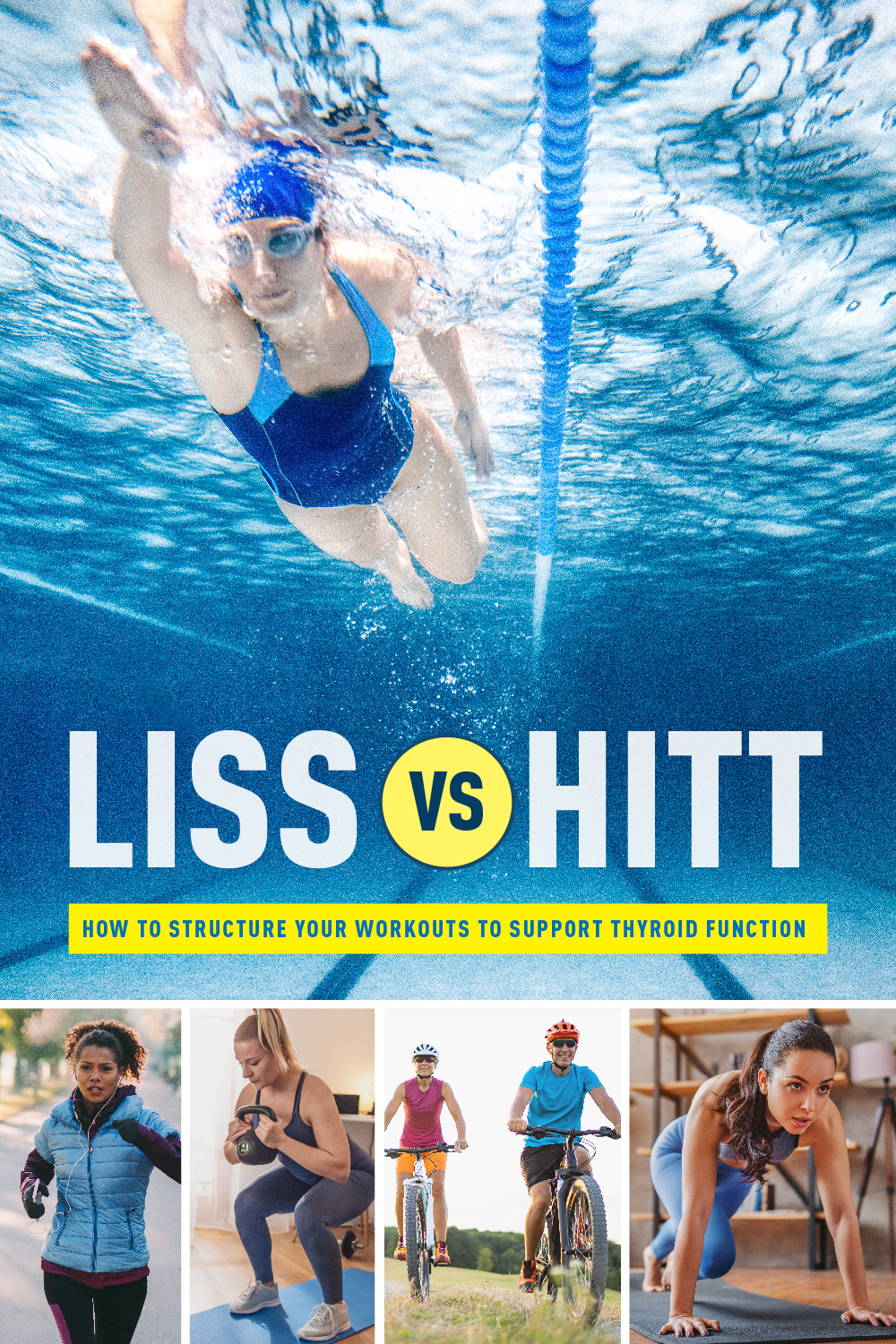Expert Advice

Acella Pharmaceuticals, LLC., is partnering with Angila Berni, M.S., SFG II, RYT to bring greater awareness to the importance of thyroid care and education. This post is sponsored by Acella Pharmaceuticals and should not be construed as medical advice. Please talk to your doctor about your individual medical situation.
Disclaimer: The information provided is for educational purposes only and does not substitute professional medical advice. Consult a medical professional or healthcare provider before beginning any exercise, fitness, diet, or nutrition routine.
Both low-intensity steady-state (LISS) and high-intensity interval training (HIIT) are tried and true cardio options. There are certain types of exercise that fit within each style of cardio. For those managing hypothyroidism, each style of cardio brings different benefits to their fitness and wellness journey.
Low-Intensity Steady-State
LISS is a type of cardiovascular exercise performed at a low intensity for a sustained length of time. The power should remain constant at 50-70 percent of your max heart rate throughout the session and last for 30-60 minutes. The talk test is a simple way to determine if you are in the LISS zone. You should be able to hold a conversation while exercising at this intensity. LISS examples are brisk walking, light jogging, swimming, rowing, and cycling. Benefits include the low impact on the joints, improved cardiovascular health, and burning calories. It’s also a great way to ease into a fitness routine.
High-Intensity Interval Training
HIIT is the opposite of LISS. It involves short bouts of vigorous exercise followed by brief rest periods. In contrast to LISS, the intensity for HIIT is near maximal effort. This increase in heart rate lasts for 20-60 seconds and is followed by a recovery period to get the heart rate back down. The types of exercises used during HIIT vary. During a HIIT workout, almost anything can be done, including interval sprints, cycling, weights, kettlebells, and bodyweight exercises. HIIT benefits are shorter workout times, improved cardiovascular system, burning more calories in less time than LISS, and some think it’s more fun.
LISS vs. HIIT
LISS is an excellent strategy for fat burning at a slower pace with less impact on the joints. The advantage of HIIT is that it burns more calories in less time. Both improve the cardiovascular system, help control weight, improve mood, boost energy, and promote better sleep. Both types of exercise help manage symptoms of thyroid disease by decreasing fatigue and weight gain. Which one is better? They both have benefits! LISS is great for someone that is severely overweight or just starting an exercise routine because it reduces the risk of injury. HIIT is ideal if time is a limitation. The best approach is to develop a workout routine that works best for you and your situation. Both LISS and HIIT would be the best option in a perfect world. LISS helps burn fat, while HIIT burns more calories in less time. The combined benefits of both are optimal.
As a certified personal trainer, I recommend that my clients aim for at least 150 minutes of LISS and 2 to 3 sessions of HIIT for 10-20 minutes per week. Find exercises that you enjoy and invite a friend for extra motivation.

1155-v1
Note that DTE products, including NP Thyroid®, have not been reviewed by the FDA for safety or efficacy.
IMPORTANT RISK INFORMATION, INCLUDING BOXED WARNING & INDICATIONS
Important Risk Information
Drugs with thyroid hormone activity, alone or together with other therapeutic agents, have been used for the treatment of obesity. In euthyroid patients, doses within the range of daily hormonal requirements are ineffective for weight reduction. Larger doses may produce serious or even life-threatening manifestations of toxicity, particularly when given in association with sympathomimetic amines such as those used for their anorectic effects.
- NP Thyroid® is contraindicated in patients with uncorrected adrenal insufficiency, untreated thyrotoxicosis, and hypersensitivity to any component of the product.
- In the elderly and in patients with cardiovascular disease, NP Thyroid® should be used with greater caution than younger patients or those without cardiovascular disease.
- Use of NP Thyroid® in patients with diabetes mellitus or adrenal cortical insufficiency may worsen the intensity of their symptoms.
- The therapy of myxedema coma requires simultaneous administration of glucocorticoids.
- Concomitant use of NP Thyroid® with oral anticoagulants alters the sensitivity of oral anticoagulants. Prothrombin time should be closely monitored in thyroid-treated patients on oral anticoagulants.
- In infants, excessive doses of NP Thyroid® may produce craniosynostosis.
- Partial loss of hair may be experienced by children in the first few months of therapy but is usually transient.
- Adverse reactions associated with NP Thyroid® therapy are primarily those of hyperthyroidism due to therapeutic overdosage.
- Many drugs and some laboratory tests may alter the therapeutic response to NP Thyroid ®. In addition, thyroid hormones and thyroid status have varied effects on the pharmacokinetics and actions of other drugs. Administer at least 4 hours before or after drugs that are known to interfere with absorption. Evaluate the need for dose adjustments when regularly administering within one hour of certain foods that may affect absorption.
- NP Thyroid® should not be discontinued during pregnancy, and hypothyroidism diagnosed during pregnancy should be promptly treated.
Indications
NP Thyroid® (thyroid tablets, USP) is a prescription medicine that is used to treat a condition called hypothyroidism from any cause, except for cases of temporary hypothyroidism, which is usually associated with an inflammation of the thyroid (thyroiditis). It is meant to replace or supplement a hormone that is usually made by your thyroid gland.
NP Thyroid® is also used in the treatment and prevention of normal functioning thyroid goiters, such as thyroid nodules, Hashimoto’s thyroiditis, multinodular goiter, and in the management of thyroid cancer.
Revised
10/2023
You Are About To Leave This Website
By clicking continue, this link will take you to a website to which Alora Pharmaceuticals’ Policies & Terms of Use do not apply.
^Based on prescriptions filled, NP Thyroid® is the #1 Prescribed DTE in the United States. Source: IQVIA National Prescription Audit (NPA) data on file. Acella Pharmaceuticals, LLC.
